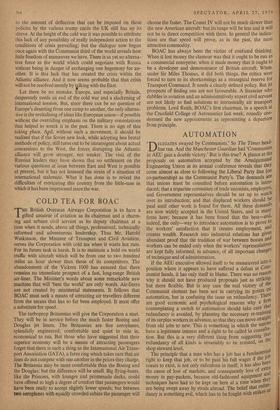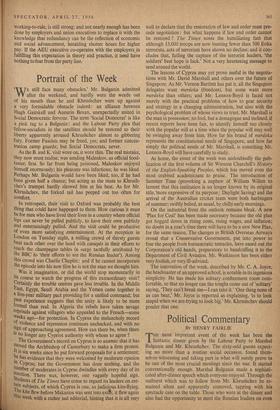AUTOMATION
DELEGATES swayed by Communists.' So The Times head- line ran. And the Manchester Guardian had 'Communists in AEU gain a double victory.' But is this true'? A glance at the proposals on automation accepted by the Amalgamated Engineering Union at its annual conference reveals that they come almost as close to following the Liberal Party line ton co-partnership) as the Communist Party's. The demands are that unions must be consulted before automation is intro- duced; that a tripartite committee of trade unionists, employers, and Government representatives should be set up to watch over its introduction; and that displaced workers should be paid until other work is found for them. All these demands are now widely accepted in the United States, and in manY firms here; because it has been found that the best—and• indeed, the only—way to introduce automation is to prove to the workers' satisfaction that it creates employment. and creates wealth. Research into industrial relations has given, abundant proof that the tradition of war between bosses and workers can be ended only when the workers' representatives are kept fully informed, in advance, of all important changes of technique and of administration. If the AEU executive allowed itself to be manoeuvred into n position where it appears to have suffered a defeat at Com- munist hands, it has only itself to, blame. There was no reason why it should not have produced proposals just as striking, but More flexible. But in any case the real victory of the Communist element has been not in carrying its points on automation, but in confusing the issue on redundancy. There are good economic and psychological reasons why a firm contemplating a switch to automation should take care that redundancy is avoided, by planning the necessary re-training of its surplus workers in advance, so that they can move straight', from old jobs to new. This is something in which the unions have a legitimate interest and a right to be called in consults, tion. But this is a very different thing from suggesting that redundancy of all kinds is invariably to be resisted, on the shop steward level. The principle that a man- who has a job has a fundamental right to keep that job. or to be paid his full wages if the kw_ ceases to exist, is not only ridiculous in itself; it has also been the cause of losg of markets, and consequently loss of Otrkt, money in pay-packets, because old-fashioned equipment and techniques have had to be kept on here at a time when they are being swept away by rivals abroad. The belief that redun- dancy is something evil, which has to be fought with strikes or Working-to-rule, is still strong; and not nearly enough has been done by employers and union executives to replace it with the knowledge that redundancy can be the reflection of economic and social advancement, heralding shorter hours for higher pay. If the AEU executive co-operates with the employers in fulfilling this expectation in theory and practice, it need have nothing to fear from the party line.











































 Previous page
Previous page